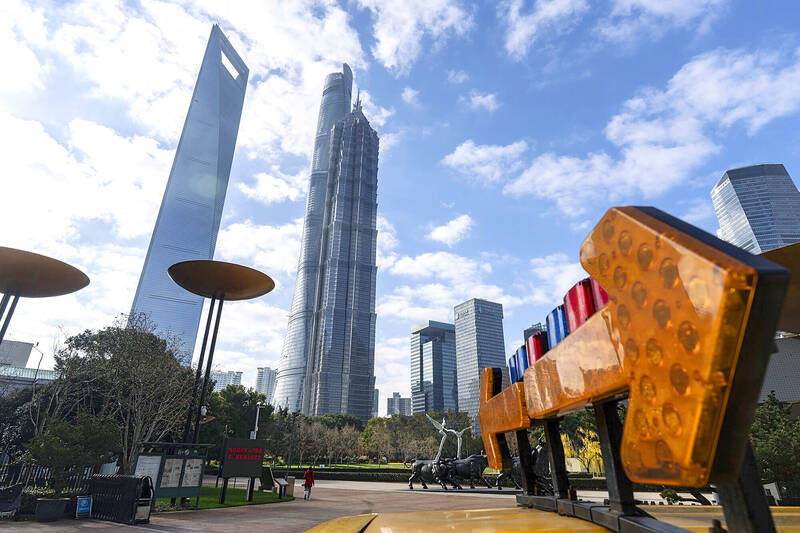China is to sharply increase funding from ultra-long treasury bonds this year to spur business investment and consumer-boosting initiatives, a state planner official told a news conference yesterday, as Beijing cranks up fiscal stimulus to revitalize its faltering economy.
Special treasury bonds would be used to fund large-scale equipment upgrades and consumer goods trade-ins, said Yuan Da (袁達), deputy secretary-general of the Chinese National Development and Reform Commission.
“The size of ultra-long special government bond funds will be sharply increased this year to intensify and expand the implementation of the two new initiatives,” Yuan said.

Photo: Bloomberg
Under the program launched last year, consumers can trade-in old cars or appliances and buy new ones at a discount, while a separate program subsidizes large-scale equipment upgrades for businesses.
Households would be eligible for subsidies to buy three types of digital products this year, including cell phones, tablets, smart watches and bracelets, Yuan said.
The commission last month said that Beijing had fully allocated all proceeds from 1 trillion yuan (US$136.68 billion) in ultra-long special treasury bonds last year, with about 70 percent of the proceeds financing “two major projects” and the remainder going toward the new initiatives.
Chinese leaders have pledged to “vigorously” boost consumption this year, raising expectations of more policy steps to spur demand and fight deflationary risks.
Millions of government workers across China were given surprise wage increases this week, people affected by the move said, as Beijing looks to boost spending.
China would also increase funding from special treasury bonds and expand the scope for another program that focuses on supporting key strategic sectors, said Zhao Chenxin (趙辰昕), vice head of the state planner.
The Chinese government has approved projects for this year worth 100 billion yuan under this scheme in advance, Zhao told the news conference.
The major programs refer to projects such as construction of railways and airports, development of farmland and building security capacity in key areas, official documents showed.
The world’s second-biggest economy has struggled over the past few years due to a severe property crisis, high local government debt and weak consumer demand. Exports, one of the few bright spots, could face more US tariffs after US president-elect Donald Trump takes office on Jan. 20.
China is likely to allow local governments to increase issuance of special bonds to 4.7 trillion yuan this year, up from 3.9 trillion yuan last year, said Zhang Ming (張明), an economist at the Chinese Academy of Social Sciences, a think tank.
The combined special treasury and local bonds and the annual budget deficit could approach 13 trillion yuan this year, or 9 to 10 percent of GDP, Zhang said in an article published on the Web site of China Chief Economist Forum.
“Such a level of broad-based deficit would be rare in history,” Zhang said.
Yuan said that China had ample policy space to underpin growth this year.
“We are fully confident of driving continued economic recovery this year,” he said.

Hon Hai Precision Industry Co (鴻海精密) yesterday said that its research institute has launched its first advanced artificial intelligence (AI) large language model (LLM) using traditional Chinese, with technology assistance from Nvidia Corp. Hon Hai, also known as Foxconn Technology Group (富士康科技集團), said the LLM, FoxBrain, is expected to improve its data analysis capabilities for smart manufacturing, and electric vehicle and smart city development. An LLM is a type of AI trained on vast amounts of text data and uses deep learning techniques, particularly neural networks, to process and generate language. They are essential for building and improving AI-powered servers. Nvidia provided assistance

DOMESTIC SUPPLY: The probe comes as Donald Trump has called for the repeal of the US$52.7 billion CHIPS and Science Act, which the US Congress passed in 2022 The Office of the US Trade Representative is to hold a hearing tomorrow into older Chinese-made “legacy” semiconductors that could heap more US tariffs on chips from China that power everyday goods from cars to washing machines to telecoms equipment. The probe, which began during former US president Joe Biden’s tenure in December last year, aims to protect US and other semiconductor producers from China’s massive state-driven buildup of domestic chip supply. A 50 percent US tariff on Chinese semiconductors began on Jan. 1. Legacy chips use older manufacturing processes introduced more than a decade ago and are often far simpler than

STILL HOPEFUL: Delayed payment of NT$5.35 billion from an Indian server client sent its earnings plunging last year, but the firm expects a gradual pickup ahead Asustek Computer Inc (華碩), the world’s No. 5 PC vendor, yesterday reported an 87 percent slump in net profit for last year, dragged by a massive overdue payment from an Indian cloud service provider. The Indian customer has delayed payment totaling NT$5.35 billion (US$162.7 million), Asustek chief financial officer Nick Wu (吳長榮) told an online earnings conference. Asustek shipped servers to India between April and June last year. The customer told Asustek that it is launching multiple fundraising projects and expected to repay the debt in the short term, Wu said. The Indian customer accounted for less than 10 percent to Asustek’s

Gasoline and diesel prices this week are to decrease NT$0.5 and NT$1 per liter respectively as international crude prices continued to fall last week, CPC Corp, Taiwan (CPC, 台灣中油) and Formosa Petrochemical Corp (台塑石化) said yesterday. Effective today, gasoline prices at CPC and Formosa stations are to decrease to NT$29.2, NT$30.7 and NT$32.7 per liter for 92, 95 and 98-octane unleaded gasoline respectively, while premium diesel is to cost NT$27.9 per liter at CPC stations and NT$27.7 at Formosa pumps, the companies said in separate statements. Global crude oil prices dropped last week after the eight OPEC+ members said they would